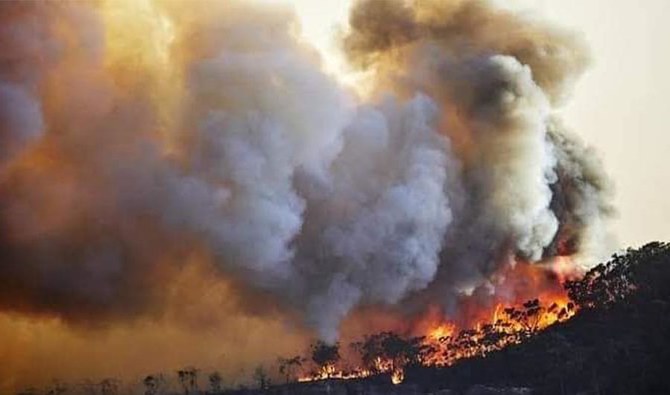ISLAMABAD: Pakistan’s top diplomat in Tehran announced on Tuesday a special Iranian air tanker had reached Pakistan to help put out fires that have been raging for almost two weeks in a forest in Balochistan’s Sherani district in which at least three people have been killed.
The fire first erupted on May 9.
Firefighters from the provincial and national disaster management authorities have for days tried to quench the flames, using rescue vehicles and firefighting equipment, with little success. The Pakistan Army has established a base camp in the area and provided two helicopters to assist in the firefighting operation.
Paramilitary forces like the Frontier Corps and Levies have also been participating in relief and rescue operations.
The fire has destroyed hundreds of thousands of trees dotting the Koh-e-Sulaiman mountain range that is home to the world’s largest Chilghoza (pine nuts) forest, annually producing about 640,000 kilograms of the edible seed.
“An #Iranian IL76 airtanker [especially] designed for firefighting has arrived in #Pakistan to take part in [operations] to extinguish #SheraniForest fire in Koh I Suleman, #Balochistan,” Ambassador Rahim Hayat Qureshi, who is also Pakistan’s permanent representative to the Economic Cooperation Organization, said in a Twitter post. “Grateful to [government] of #Iran for their prompt response to our request for assistance.”
The provincial administration of Balochistan on Sunday formed a nine-member task force to tackle the fire on the directives of Prime Minister Shehbaz Sharif.
A spokesperson of the Iranian consulate in Quetta announced Monday Tehran had agreed to provide its largest firefighting air tanker, Ilyushin Il-76, to Pakistan on the request of the administration in Islamabad.
“The plane will take off from Noor Khan Air Base to extinguish the forest fires in Sherani district and will remain in Pakistan until the forest fires are brought under control,” the Iranian consulate said.
The Iranian air tanker has previously been used to control forest fires in Georgia, Armenia, and Turkey. It can launch up to 40 tons of water in the air.
Balochistan’s secretary forests Dostain Jamaldini said the Iranian air tanker had started the firefighting operation while adding that the blaze had damaged 44 square kilometers of the area.
He noted the Iranian aircraft had “almost extinguished the flames,” adding the local authorities were trying to assess the situation on the ground and would request the federal government for another firefighting round if it was thought necessary.
Jamaldini said his department would start evaluating the extent of the damage caused by the fire after it was completely extinguished.
Pakistan is the eighth most vulnerable country to extreme weather caused by climate change, according to the Global Climate Risk Index compiled by environmental NGO Germanwatch.
Temperatures have peaked at 51 degrees Celsius in parts of Pakistan in recent days, leaving the poor and vulnerable struggling to beat the heat in the impoverished country.
















